Mahabharata’s Darkest Question: Was Krishna Really Responsible?
Noopur Bhatt | Apr 19, 2025, 19:50 IST
( Image credit : Times Life Bureau, Timeslife )
Was Krishna the cause of the Kurukshetra war, or the one who tried to prevent it? This emotionally powerful article explores how Lord Krishna's role in the Mahabharata wasn’t of a warrior, but of a wise guide, mentor, and divine friend. While some, like Queen Gandhari, held Him responsible, the truth runs deeper. This story is not just a tale of ancient kings—it’s the mirror of our modern emotional conflicts, egos, and choices. Walk through the war-torn journey of dharma, betrayal, and divine wisdom—and discover how Krishna didn’t create the war, but showed humanity a way through it.
Was one of the biggest battles in history really caused by the flute-playing holy spirit, Lord Krishna? Or are we failing to see the deeper truth—just as we often do in our personal lives? This is not a mythological question. It concerns us. It has to do with how we handle justice, ambition, jealousy, and ego. Some voices, like Gandhari's, have dared to blame Krishna while millions of people bow down to him in temples and homes. After seeing her boys' deaths, she angrily and tearfully cursed Krishna. But take a moment to consider whether Krishna was the cause or just the compass. Together, let's traverse this route as truth-seekers rather than mythology readers. There is more to this story than battle. It's about all the chaos we cause when our ego overrides our conscience.
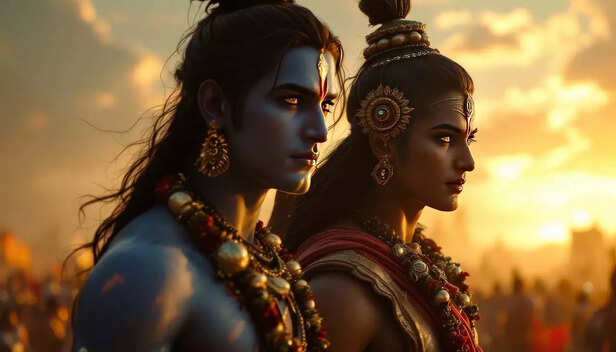
Jealousy is never born on the battlefield. It grows silently in the heart. Envy was poisoning hearts before swords were drawn and arrows flew. The affection and reverence shown to the Pandavas were too much for Duryodhana, the Kauravas' crown prince. For Yudhishthir, his fate as king was intolerable. He frequently colluded with Shakuni, attempted to burn the Pandavas alive in Lakshagraha, and planned to assassinate Bheem. Why did it all happen? a frail ego that cannot tolerate the brilliance of others. Don't we still observe this in workplaces and families today? Where does the success of one individual turn into the insecurity of another?
No relationship, no dharma, can endure when the heart becomes bitter.
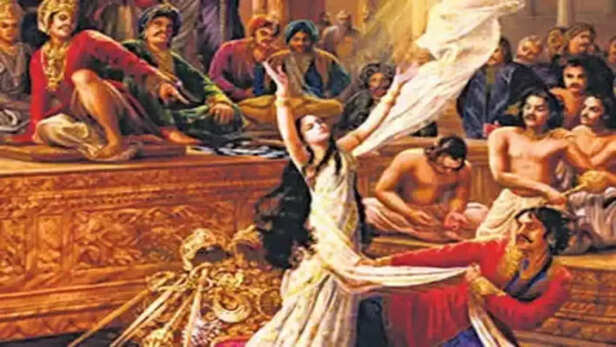
Yudhishthir lost everything in a game in a chamber cloaked in deceit, including his siblings, his dignity, and Draupadi, in addition to money and land. Draupadi shouted out as she was dragged and humiliated in front of elders, but it was to Krishna rather than the court or her husbands. And though Krishna wasn’t physically present, He answered. We still see this, don't we? In households where injustice is ignored, in businesses where women are disparaged? This was the downfall of an empire, not just the downfall of a queen.
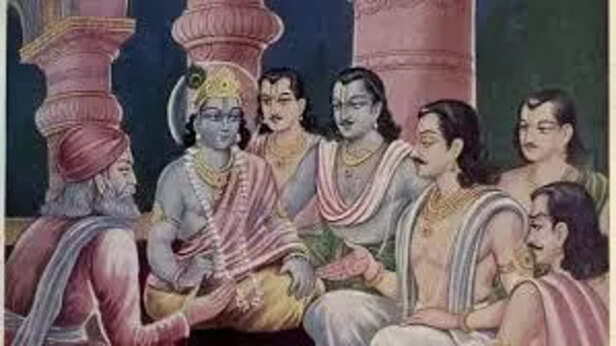
Even God begged for peace. But ego chose war. Krishna arrived when the exile was over, but he brought words instead of swords. The Pandavas only requested five villages. Only five. With his palms folded, Krishna begged. "I won't give land even the size of a needlepoint," Duryodhana said with a sly smile. This was compassion pleading with hubris to see the light; it was no longer diplomacy. How frequently do the peacemakers in our lives attempt to mend damaged bonds? However, Duryodhana's ego crushed the door Krishna made every effort to halt the conflict. However, even in cases of abuse, free will cannot be coerced into changing.
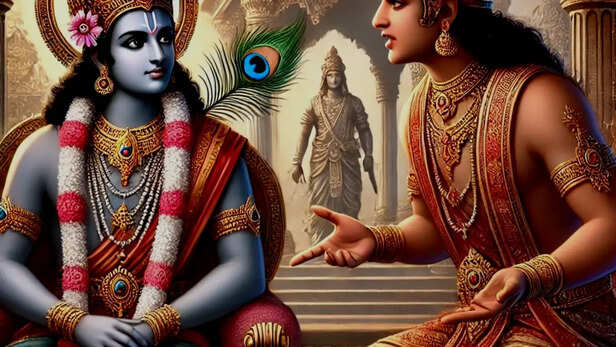
Arrogance can make you blind—even to the divine. Despite being ridiculed and humiliated, Krishna calmly revealed His true identity as the Viraat Roop. Bhishma and Drona were among the entire court who saw the universe in Him. However, Duryodhana remained unconvinced. Isn't that still the case today? Because our ego doesn't want to be incorrect, we disregard the facts, signals, and voices that are trying to lead us. Krishna didn't frighten anyone by revealing His cosmic form. He displayed it to arouse
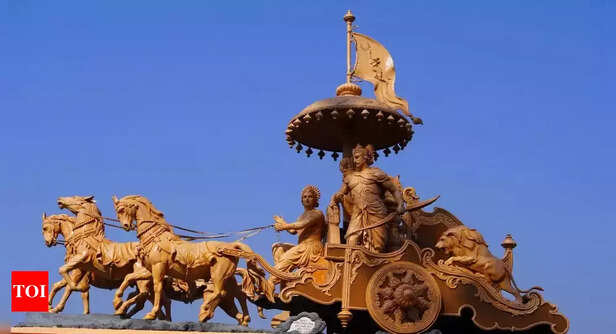
The divine doesn’t always fight for you—it helps you fight your own battles. Krishna promised not to pick up a weapon. He would simply offer guidance. Krishna did not coerce Arjuna into standing in the centre of the battlefield when he was trembling. He gave him advice. The Bhagavad Gita emerged from that celestial conversation. What was his message? "Perform your duties. devoid of attachment. Fearlessly. without ego. Sometimes we are confused, grieved, and torn between good and wrong, aren't we all like Arjuna? And we can still hear Krishna's voice whispering to us, but with serene clarity rather than thunder. 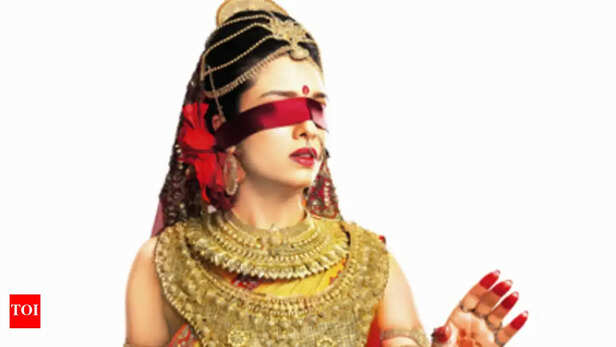
Pain blinds even the wisest hearts. Gandhari's suffering turned to fire after her hundred boys were dead. She cursed Krishna, saying that his clan would also die. Krishna took it without protest. Since he was aware that his own people had deviated from dharma. Retaliation was never the goal. The goal was to get things back in balance. We frequently place the blame on those who supported us in our own life since they were powerless to prevent the outcomes we invited. Understanding that even divine hands cannot stop what human hearts choose to create, however, is the foundation of great wisdom.
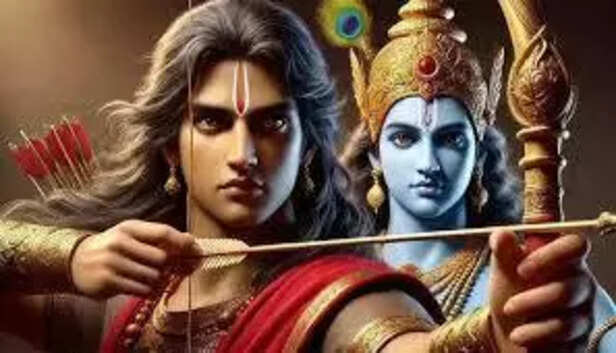
The mirror didn’t cause the fire. It only showed the smoke. It was human decisions, years of unbridled ambition, treachery, and pride that wrote the Mahabharata war, not Krishna. Krishna didn't light a spark. He attempted to put out the fire. But he walked with those who upheld dharma when the fire was unavoidable. Our lives are still filled with Kurukshetras, where nations quarrel over pride, lovers over vanity, and families over property. Krishna continues to stand, not to defend us but to serve as a reminder to make moral decisions, let go of pride, and act morallyDon't hold the guide responsible when you find yourself at a crossroads with conflicting emotions. Did you listen? Ask yourself. Unbearable loss gave rise to Gandhari's curse. However, Krishna never played the part of a destroyer. He arrived as a teacher of truth, a guardian of dharma, and a herald of peace.Even now, Krishna's teaching reverberates in every dispute, heartache, and ego battle we engage Feel this truth, reflect on it, and the next time you're blamed for doing the right thing—remember Krishna.“You have the right to act, but not to the fruits. Let go of results. Let go of pride. Be present in your truth. So, was Krishna responsible for the war?No. He was responsible for guiding us through it.
Explore the latest trends and tips in Health & Fitness, Travel, Life Hacks, Fashion & Beauty, and Relationships at Times Life!
1. The Seed of Hatred Was Sown Early

Duryodhana and the Pandavas
( Image credit : Pixabay )
Jealousy is never born on the battlefield. It grows silently in the heart. Envy was poisoning hearts before swords were drawn and arrows flew. The affection and reverence shown to the Pandavas were too much for Duryodhana, the Kauravas' crown prince. For Yudhishthir, his fate as king was intolerable. He frequently colluded with Shakuni, attempted to burn the Pandavas alive in Lakshagraha, and planned to assassinate Bheem. Why did it all happen? a frail ego that cannot tolerate the brilliance of others. Don't we still observe this in workplaces and families today? Where does the success of one individual turn into the insecurity of another?
No relationship, no dharma, can endure when the heart becomes bitter.
2. The Dice Game That Ruined a Nation

Yudhishthir losing Draupadi in the dice game
( Image credit : Times Life Bureau )
Yudhishthir lost everything in a game in a chamber cloaked in deceit, including his siblings, his dignity, and Draupadi, in addition to money and land. Draupadi shouted out as she was dragged and humiliated in front of elders, but it was to Krishna rather than the court or her husbands. And though Krishna wasn’t physically present, He answered. We still see this, don't we? In households where injustice is ignored, in businesses where women are disparaged? This was the downfall of an empire, not just the downfall of a queen.
3. Krishna’s Peace Mission: The Final Attempt

Krishna
( Image credit : Times Life Bureau )
Even God begged for peace. But ego chose war. Krishna arrived when the exile was over, but he brought words instead of swords. The Pandavas only requested five villages. Only five. With his palms folded, Krishna begged. "I won't give land even the size of a needlepoint," Duryodhana said with a sly smile. This was compassion pleading with hubris to see the light; it was no longer diplomacy. How frequently do the peacemakers in our lives attempt to mend damaged bonds? However, Duryodhana's ego crushed the door Krishna made every effort to halt the conflict. However, even in cases of abuse, free will cannot be coerced into changing.
4. Krishna’s Viraat Roop: When Truth Reveals Itself

Krishna
( Image credit : Times Life Bureau )
Arrogance can make you blind—even to the divine. Despite being ridiculed and humiliated, Krishna calmly revealed His true identity as the Viraat Roop. Bhishma and Drona were among the entire court who saw the universe in Him. However, Duryodhana remained unconvinced. Isn't that still the case today? Because our ego doesn't want to be incorrect, we disregard the facts, signals, and voices that are trying to lead us. Krishna didn't frighten anyone by revealing His cosmic form. He displayed it to arouse
5. Krishna, the Charioteer, Not the Warrior

Krishna, the Charioteer
( Image credit : Times Life Bureau )
The divine doesn’t always fight for you—it helps you fight your own battles. Krishna promised not to pick up a weapon. He would simply offer guidance. Krishna did not coerce Arjuna into standing in the centre of the battlefield when he was trembling. He gave him advice. The Bhagavad Gita emerged from that celestial conversation. What was his message? "Perform your duties. devoid of attachment. Fearlessly. without ego. Sometimes we are confused, grieved, and torn between good and wrong, aren't we all like Arjuna? And we can still hear Krishna's voice whispering to us, but with serene clarity rather than thunder.
6. Was Gandhari’s Curse Justified?

Gandhari
( Image credit : Times Life Bureau )
Pain blinds even the wisest hearts. Gandhari's suffering turned to fire after her hundred boys were dead. She cursed Krishna, saying that his clan would also die. Krishna took it without protest. Since he was aware that his own people had deviated from dharma. Retaliation was never the goal. The goal was to get things back in balance. We frequently place the blame on those who supported us in our own life since they were powerless to prevent the outcomes we invited. Understanding that even divine hands cannot stop what human hearts choose to create, however, is the foundation of great wisdom.
7. The War Was Humanity’s Reflection, Not Krishna’s Creation

Krishna watching
( Image credit : Times Life Bureau )
The mirror didn’t cause the fire. It only showed the smoke. It was human decisions, years of unbridled ambition, treachery, and pride that wrote the Mahabharata war, not Krishna. Krishna didn't light a spark. He attempted to put out the fire. But he walked with those who upheld dharma when the fire was unavoidable. Our lives are still filled with Kurukshetras, where nations quarrel over pride, lovers over vanity, and families over property. Krishna continues to stand, not to defend us but to serve as a reminder to make moral decisions, let go of pride, and act morally
Krishna Wasn’t the Cause, He Was the Compass
Explore the latest trends and tips in Health & Fitness, Travel, Life Hacks, Fashion & Beauty, and Relationships at Times Life!
